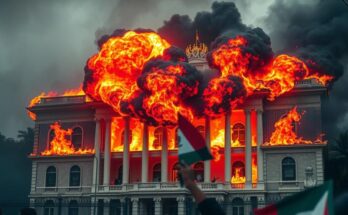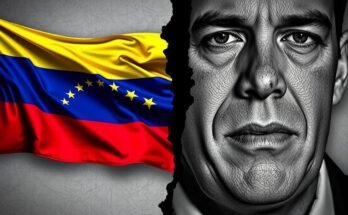Nigeria and Libya are embroiled in a dispute following Nigeria’s decision to boycott a qualifying match for the 2025 AFCON. Miscommunication over flight arrangements led to significant delays and allegations of poor treatment from both sides. This incident contributes to a growing history of logistical difficulties faced by visiting teams in Nigeria, revealing broader issues within international sports relations.
The diplomatic tensions between Nigeria and Libya have intensified following a debacle that resulted in Nigeria’s Super Eagles boycotting a crucial match against Libya’s Mediterranean Knights as part of the qualification process for the 2025 African Cup of Nations (AFCON). During a testimony before the Confederation of African Football’s disciplinary committee on October 20, both nations articulated conflicting accounts regarding the incident that transpired prior to the game. The roots of the conflict are traced to the unexpected rerouting of the Nigerian Super Eagles’ flight intended for Benghazi, which was diverted to Al Abraq Airport, located in Bayda. This change forced the Super Eagles to remain at the airport for more than 18 hours without any accommodations or provisions for food, prompting the Nigeria Football Federation (NFF) to lodge a formal complaint with the Confederation of African Football, condemning the treatment of their players as intolerable. While the Libyan authorities acknowledged a logistical error and extended an apology, they insinuated that this incident may have been a reaction to difficulties their team faced in Nigeria merely a week prior. The Libyan Football Federation circulated images and videos showcasing their players stranded at Port Harcourt Airport in Nigeria for three hours without transportation to their hotel, drawing considerable attention online. “The same thing, and even worse, happened to Libya in Nigeria last week,” was the sentiment expressed by the Libyan Football Federation, highlighting the ongoing dispute. Reports from both nations corroborated claims by Libyan Captain Faisal Al-Badri, asserting that Nigerian officials denied their team landing rights at the more accessible Uyo Airport, compelling them to land in Port Harcourt instead. The distressing journey included being subjected to prolonged security checks and transport through treacherous roads at night without an escort. Emmanuel Ayanbunmi, an assistant director of the NFF, countered the claims of mistreatment, asserting that the Libyan Football Federation created confusion regarding their travel plans. This situation is not an anomaly for the NFF, as similar grievances have surfaced in previous matches, including an incident involving the South African team being subjected to significant delays during their travels to Nigeria. Moreover, historical precedents exist, such as the experience of the Kenyan team in 2013, who reported inadequate facilities during their stay for a World Cup qualifier. The ongoing tension underscores a troubling pattern of logistical challenges faced by visiting teams in Nigeria, reinforcing calls for improved management of international sporting events.
This controversy stems from a series of logistical issues and diplomatic friction between Nigeria and Libya, primarily revolving around the treatment of visiting football teams. The current episode highlights the ramifications of miscommunication and the implications of operational failures that can affect the stature of nations in the realm of international sports. Such incidents have a history, with previous occurrences affecting various teams and feeding into a narrative that demands accountability and better handling of foreign teams traveling to Nigeria. This is crucial for maintaining decorum in international relations through sports.
In conclusion, the incident between the Nigerian Super Eagles and the Libyan Mediterranean Knights illustrates the complex interplay of logistics, diplomacy, and sportsmanship. The reciprocal allegations of mistreatment have not only escalated tensions between the two nations but have also spotlighted the need for enhanced operational protocols in managing international sporting events. Both federations must engage in constructive dialogue to foster a more amicable sporting environment and prevent recurring disputes in the future.
Original Source: www.voanews.com




